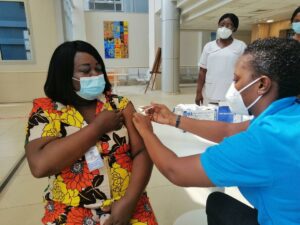Select Committee on Health worried about low COVID-19 vaccination coverage in rural areas
 The Parliamentary Select Committee on Health has expressed concern about the low patronage of the nationwide COVID-19 vaccination exercise, especially in the rural communities.
The Parliamentary Select Committee on Health has expressed concern about the low patronage of the nationwide COVID-19 vaccination exercise, especially in the rural communities.
Dr. Ayew Afriyie, Chairman of the Committee said though there was a general vaccine hesitancy among the public, the situation in rural areas was a cause for concern and stressed the need for all stakeholders to step up advocacy to address the problem.
Briefing the media in Kumasi, as part of efforts by the Committee to whip up public interest in the exercise, Dr. Afriyie said the coverage in the urban centres was more encouraging than the districts and sub-districts.
This, he noted, was worrying because people in those areas were the most vulnerable and needed protection more than those in the cities and urban areas.
According to him, experts had predicted that rural communities were most likely going to suffer the impact of the virus in the event of another wave.
He said the Committee believed that vaccine coverage in the Ashanti region, which had the second highest number of cases was low and appealed to the public to avail themselves of the vaccination exercise.
He noted that achieving herd immunity as a country was a collective responsibility of every Ghanaian and must not be left to health authorities and the government alone.
Stakeholders such as political actors, traditional authorities, opinion leaders, civil society organisations and the media have critical roles to play to significantly reduce the risk of transmission, he observed.
“The vaccines are available in every district, and I encourage everyone who has not taken the jab to do so not only for their own protection but that of their families and close associates,” he advised.
Dr. Emmanuel Tinkorang, the Regional Director of Health Services disclosed that 1,447,147 people, representing 42.2 percent of the eligible population in the region had been fully vaccinated.
He said 2,149,840 people representing 62.7 per cent had taken at least one dose, with 332, 143 representing 9.6 per cent receiving the booster dose.
The Regional Director also revealed that Afigya Kwabre South recorded the lowest coverage (28.6 percent) for those who had taken at least one dose, with Kwabre East recording the lowest (18.1 per cent) in terms of those fully vaccinated.
Kumasi Metropolis has so far recorded the highest coverage (79.1 per cent) for the fully vaccinated population, a situation the Director attributed to non-residents taking advantage of the exercise in the regional capital despite not living there.
Source: GNA
